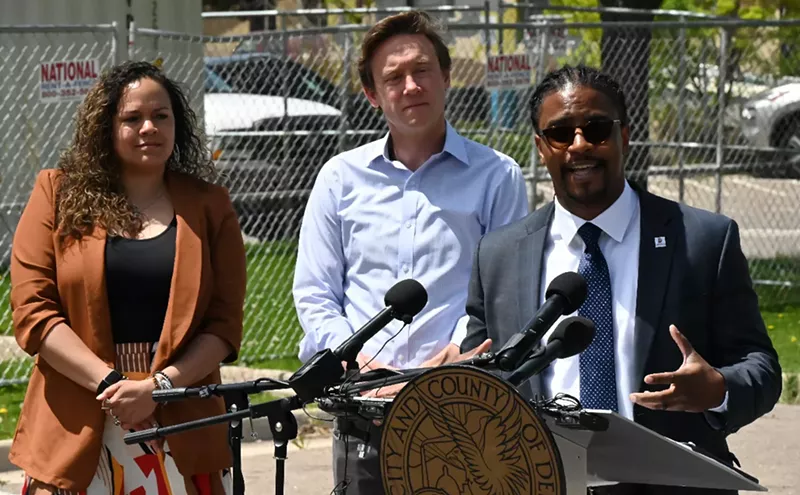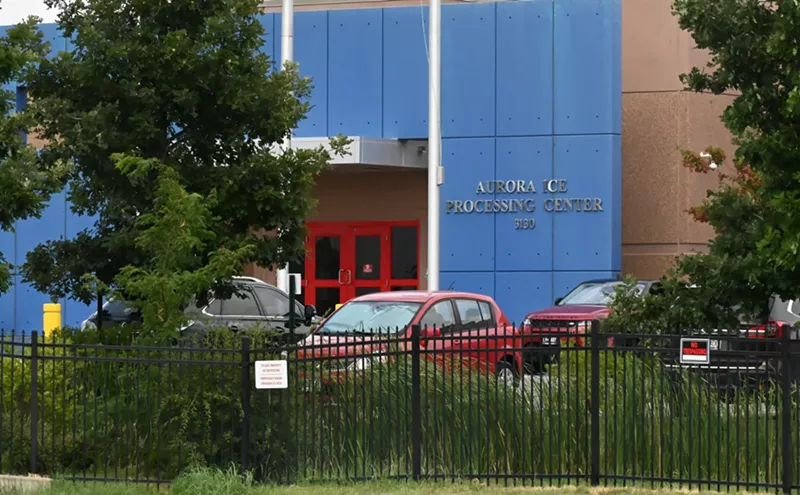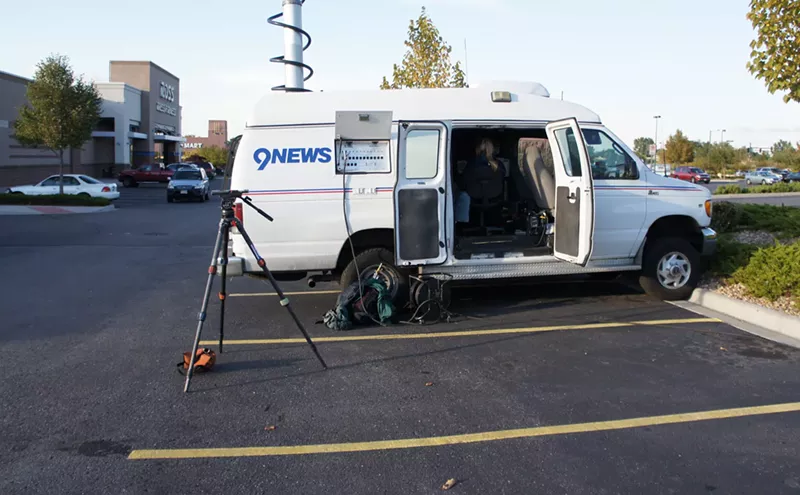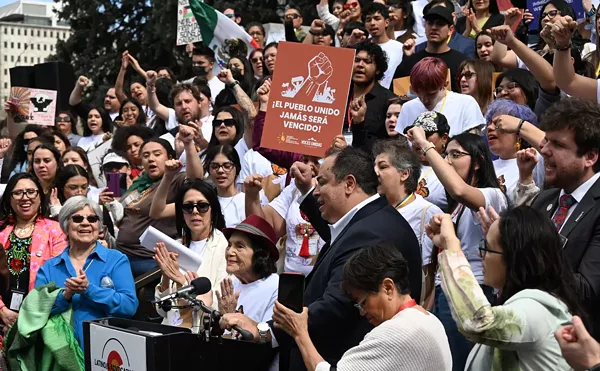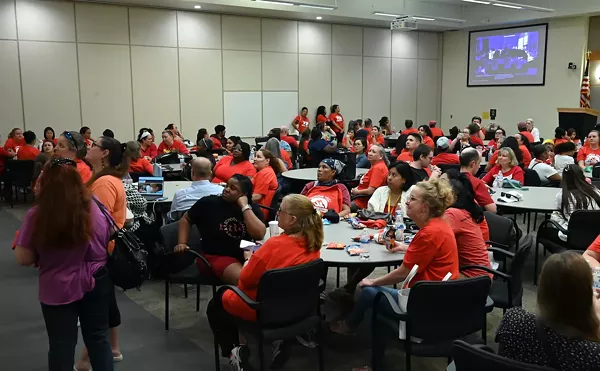Travel expense forms show that in the past fourteen months, the airport paid for a city councilwoman to attend a "Beach Baby Clam Bake" in the Virgin Islands, underwrote a week-long sojourn to the port city of Hong Kong by Mayor Wellington Webb's chief of staff, sent a city lobbyist on three trips to London, jetted an airport planning manager to Geneva, Switzerland, and Cape Town, South Africa, and financed no fewer than twelve out-of-town jaunts by the airport system's supervising attorney. In all, the city spent more than $200,000 flying politicians and administrators--and, on a handful of occasions, actual airport workers--around the globe.
Denver aviation director Jim DeLong defends the expenditures. "Our airport is about transportation," says DeLong, who adds that regular travel benefits the city by promoting DIA and keeping its officials up-to-date on aviation trends. "I conduct probably 65 to 70 percent of my business with people external to the city of Denver."
DeLong also stresses that DIA travel is paid for not with tax dollars, but from the airport revenue fund. That fund consists of fees and charges paid to the city by airlines serving DIA; the airlines in turn pass the costs along to their passengers.
DeLong's support for the city's see-the-world campaign isn't surprising: The airport boss is the king of Denver's frequent flyers. DeLong billed the airport revenue fund for $21,000 in 1995, more than any other city official. A big chunk of that went to pay for his flights to nine meetings of the trade group Airports Council International. DeLong's regular attendance at those industry confabs apparently paid off; he recently was named chairman of ACI and will spend much of 1996 out of town on ACI business while continuing to collect his full city salary of $138,480. DeLong says his various deputies will run the airport in his absence.
His extensive work for ACI benefits the city because the organization lobbies to make sure that federal aviation revenues aren't diverted from municipal airports, says DeLong. "I think as chairman of this organization, I'm in a unique position not only to fight for all the airports but quite frankly, selfishly, to fight for Denver," he says.
And Denver's top aviation official has spared no expense in waging that fight. More than $57,000 in city funds has gone to flying DeLong and other officials to ACI meetings in 1995 and 1996, including a four-day excursion last June during which airport planning manager Richard Veazey traveled to Geneva to discuss "issues of international importance pertaining to worldwide civil aviation."
Earlier this month Veazey was on the road again, jetting to Cape Town via South African Airlines to chair a meeting of ACI's technical/safety committee. On an internal expense form, Veazey explained the reason for his attendance. "Our new airport plays an important role in worldwide aviation and our participation on committees such as this raises the stature of Denver's aviation efforts in the eyes of other world airport interests," he wrote.
Veazey's international travel continued a proud tradition of globe-trotting by Denver airport employees. In October 1994, former public works manager Mike Musgrave ran up a $2,930 bill to attend the opening of a new airport in Frankfurt, Germany, including six nights at the $200-a-day Hotel Gravenbruch Kempinski. The next month, DeLong spent four days at an ACI gathering in exotic Marrakech, Morocco, where he spoke on the topic of "Thinking Big: The Risks and Opportunities for Mega-Airports." DeLong says he recalls spending only "six hours" in the North African city, but expense receipts on file at the airport indicate an $896 charge for five nights at the Mansour Eddahbi Pullman hotel.
In December 1994, it was airport operations manager Jim Dunlap who needed a passport. Herr Dunlap flew into Denver's "sister airport" in Munich to help "maintain the unique twelve-year relationship between Colorado and Bavaria." The city forked over $2,237 worth of goodwill.
At times Denver appears to use the airport revenue fund to conduct what amounts to its own foreign policy. One of DIA's most regular travelers, for example, is project manager Leslie Madsen, whom DeLong assigned to represent DIA in bilateral trade talks between the United States and the United Kingdom concerning airline service to England. Madsen took five trips to attend the trade talks last year, three of them to London, where she roomed at the exclusive Hotel Inter-Continental. "I spent most of my time in this little packed, windowless room" at the U.S. Embassy, says Madsen. "I was not down having high tea with the queen."
But why does Denver--which has no direct service to England--need its own personal ambassador to the trade talks? Madsen says she had to be there to make sure other American cities didn't get an unfair advantage in the race for new air routes. "It was very important for Denver to get out in front of this," says Madsen, who notes that 1995 was the first year the State Department allowed cities to dispatch their own representatives to aviation trade talks. The experiment in municipal diplomacy opened new travel horizons for Madsen, whose destinations the previous year included Cheyenne, Wyoming, and Steamboat Springs. But it apparently didn't pay off--the trade talks have since broken down, and Denver still has no nonstop flights to Great Britain.
Denver undertook another diplomatic endeavor this past December, when DeLong and Webb chief of staff Stephanie Foote flew to Hong Kong so Foote could pursue the mayor's vision of a "trade mission" with the Asian metropolis. While in town, the Denver duo also attempted to woo Cathay Pacific Airlines to DIA, and performed a "critique" of Hong Kong's official plan for moving to its own new airport.
But even though the trip was made in part as a favor to Hong Kong officials, Foote says no thought was given to asking Hong Kong to pick up some of the tab. "I'm not sure whether that would be appropriate," she says. Instead, Foote billed the city $4,757 for the Hong Kong trip, three quarters of which paid for her "connoisseur class" seat on United Airlines. That seat was the "only class of service available," according to an expense form on file at the airport. (DeLong says Cathay Pacific has taken Denver's suggestion of a nonstop Asian flight "under advisement.")
It is Foote, a former city councilwoman, who signs off on all out-of-town travel by city employees. And like DeLong, she defends the use of the airport revenue fund as a cash reserve for official excursions. By meeting with aviation trade groups and other organizations, she says, "We have the opportunity to tell our story, to sell other airports and other countries on what we have to offer."
Foote isn't the only Denver politician who has developed a timely interest in international aviation. In fact, it has become something of a tradition for city council members to attend ACI meetings--including the notorious 1994 get-together in Toronto where several of them got into hot water for accepting free football and theater tickets and limousine rides from a concessionaire doing business with the city.
The council's current queen of the road is at-large representative Cathy Reynolds, who makes an average of three trips a year to ACI conferences. The highlight of Reynolds's itinerary last year was a June jaunt to St. Thomas in the Virgin Islands. According to an ACI brochure, that event featured a "welcome reception" aboard the Kon Tiki Party Raft, a glass-bottom boat that was scheduled to swing to the sounds of "Milo & the Kings." After a discussion of airport financing the following day, the aviation enthusiasts were encouraged to unwind at the "Beach Baby Clam Bake." That event on "magnificent Morning Star Beach" came complete with mood-setting torches, shrimp and other grilled specialties, and dance music from Chubby Checker and Elvis Presley guaranteed to provide a "blast from the past for all."
Reynolds was one of eleven Denver officials--including four other council members--who converged on an ACI conference last September in Washington, D.C., to hear such presentations as "New Denver International Airport: A Success Story!" Joining her at the Sheraton were fellow council members Polly Flobeck, Ted Hackworth, Happy Haynes and Dennis Gallagher. DeLong spent five nights in a $203-per-night room at the Sheraton during the conference, which was apparently so exhausting that, the day after checking out, he flew back to Colorado and immediately drove to a three-day "fall retreat" at the Hyatt Regency in Beaver Creek.
Even when he stuck to lowly auto travel, DeLong showed a talent for running up a tab; when he and deputy aviation director Diane Koller motored to Colorado Ski Country USA's annual meeting last May in Colorado Springs, they checked into the ritzy Broadmoor Hotel, each reserving a $165-a-night room rather than making the one-and-a-half-hour drive back to Denver.
Though the city stresses that taxpayer dollars are not used to pay for operations at DIA, anybody who flies in or out of Denver directly subsidizes airport expenses--including travel by city officials. United Airlines provides most of DIA's ready cash because the Chicago-based carrier handles roughly 70 percent of Denver's passenger traffic. And corporate spokesman Tony Molinaro says United is not unaware of the air miles being racked up by local officials on its dime.
The carrier has made no official complaint with the city about "using funds in this manner," says Molinaro. But he says the practice "has come to our attention and we will discuss it with the city." Molinaro declines to comment on specific expenditures. "We'd rather talk to the city and get their opinion on it before we talk to anybody else," he says.
United generally doesn't mind paying for promotional efforts on behalf of DIA, notes Molinaro. "It's in all of our best interests to get that airport stronger," he says. And public relations is a common theme on DIA travel expense forms, even among city officials with no apparent training in the field. In January, deputy director for planning and engineering Norm Witteveen flew to Washington, D.C., and spent two nights at the Sheraton to give a speech at the annual meeting of the Transportation Research Board. His purpose: "To highlight the positive DIA story and how it makes good CENTS!"
Sometimes, though, it's not clear exactly what--or who--is being promoted during these excursions. In February 1994, for instance, then-acting aviation director Ginger Evans billed the revenue fund $1,564 to fly to New York City and receive the "1993 Engineering News Records Award." In a letter to her supervisor, Evans claimed the trip would provide "positive recognition for DIA and the opportunity to be honored by the engineering industry." At that time, the airport was still a year away from opening and was plagued by baggage-system snafus. But Evans clearly was in a positive frame of mind. Among her expenses was $141 worth of toffee candy, which she purchased as a "thank you gift to the ENR staff."
Other trips seemed even more peripheral to DIA matters, promotional or otherwise. In November 1995, for example, DeLong took a $1,529 trip to Washington, D.C., solely to "interview candidates for the ACI president's position." DeLong defends the use of city funds to conduct the trade group's business, noting that ACI lobbies in Washington on behalf of Denver and other cities.
The city has used the airport revenue fund as a revolving travel budget for the Webb administration's various minority advancement efforts, as well. In 1993, under pressure from the mayor's office, the airport forked over $10,000 to fund a local minority group's "trade mission" to the West African nation of Gabon. After allegations that the expenditure violated federal rules against using aviation money for non-airport purposes, the trip was investigated by a state grand jury. That body brought no criminal charges.
Cash from the airport revenue fund also has gone to cover travel and meeting expenses of the Mayor's Office of Contract Compliance, an agency set up to encourage the use of minority contractors on city proj-ects. In 1994, for example, Webb's office billed the DIA revenue fund $393 to hold a catered luncheon and "staff retreat" for 25 MOCC employees in the VIP Room at the Denver Museum of Natural History. According to an expense form, the gathering was designed to "create a more TEAM oriented environment for downtown and DIA offices of MOCC."
In May 1995, four MOCC staffers billed the revenue fund to fly to sunny San Diego for a four-day Airport Business Diversity Conference. The quartet ran up $6,300 in charges to, among other things, "promote DIA's minority/women procurement program." Last fall MOCC staff assistant Sharon Hill spent six days in Detroit attending the National Minority Suppliers Development Council Conference. Her goal: "to increase our outreach program and help develop minority business." Other MOCC destinations last year: Nashville, Tennessee, and Orlando, Florida.
Few employees, however, traveled in the style to which top officials such as DeLong and airport supervising attorney Lee Marable were accustomed. When DeLong flew to Washington, D.C., in June 1994 to give a speech at the Aero Club of Washington, his hotel bill for one night--$312 at the luxurious Capitol Hilton--could have paid the weekly salary of an airport janitor.
Marable's billing records in particular read like a traveler's guide to the nation's finest hoteliers. The attorney has billed the city $18,400 for twelve out-of-town trips in 1995 and 1996, mostly to Washington, D.C., and New York City, regarding federal investigations of alleged improprieties at DIA. There the former oil company attorney battled jet lag at three- and four-star hotels such as New York's Plaza Athne, a bastion of luxury modeled after the Paris original that features Oriental rugs and fine antiques.
In Washington, Marable usually bunked down at the J.W. Marriott, a three-star facility with a marble lobby and 24-hour room service. But DIA's top legal eagle reached the pinnacle of gracious living on the night of May 9, when he booked a two-room suite at the four-star Renaissance Mayflower on Connecticut Avenue, billing the city $250 for the privilege of spending the night surrounded by a gilded interior and having a telephone in the bathroom. The next night, Marable transferred to the Marriott, a comparative steal at only $209 per night that, according to the 1996 Mobil Travel Guide, features only "some bathroom phones."
Foote says she "can't really answer" whether Marable and other officials are spending too much on hotels. "All I know is the direction we give folks is to ask for the government rate," she says. "Some hotels have got government rates, and some don't." As for city council travel, Foote says it's justified by the fact that, under the city charter, council members are considered "commissioners of the airport system."
DeLong, meanwhile, remains adamant that Denver's travel expenses aren't out-of-line. Other American cities spend large amounts of money promoting their airports, he says. Dallas, he claims, sent 35 people to Washington, D.C., to take part in the bilateral negotiations with England. That sort of competition, he says, is why it's important for DIA to make sure its name remains prominent in the aviation world.
To further that goal, notes DeLong, next month he heads to a meeting with a Lufthansa Airlines official in New York City, continuing DIA's desperate campaign to convince somebody--anybody--to fly nonstop to Europe from Denver. But while that trip and the numerous jaunts he expects to make around the country this year for ACI will run up a good-sized tab, DeLong says he's working to keep costs down by booking coach seats whenever possible.
Says DeLong, "I fly in the back.



